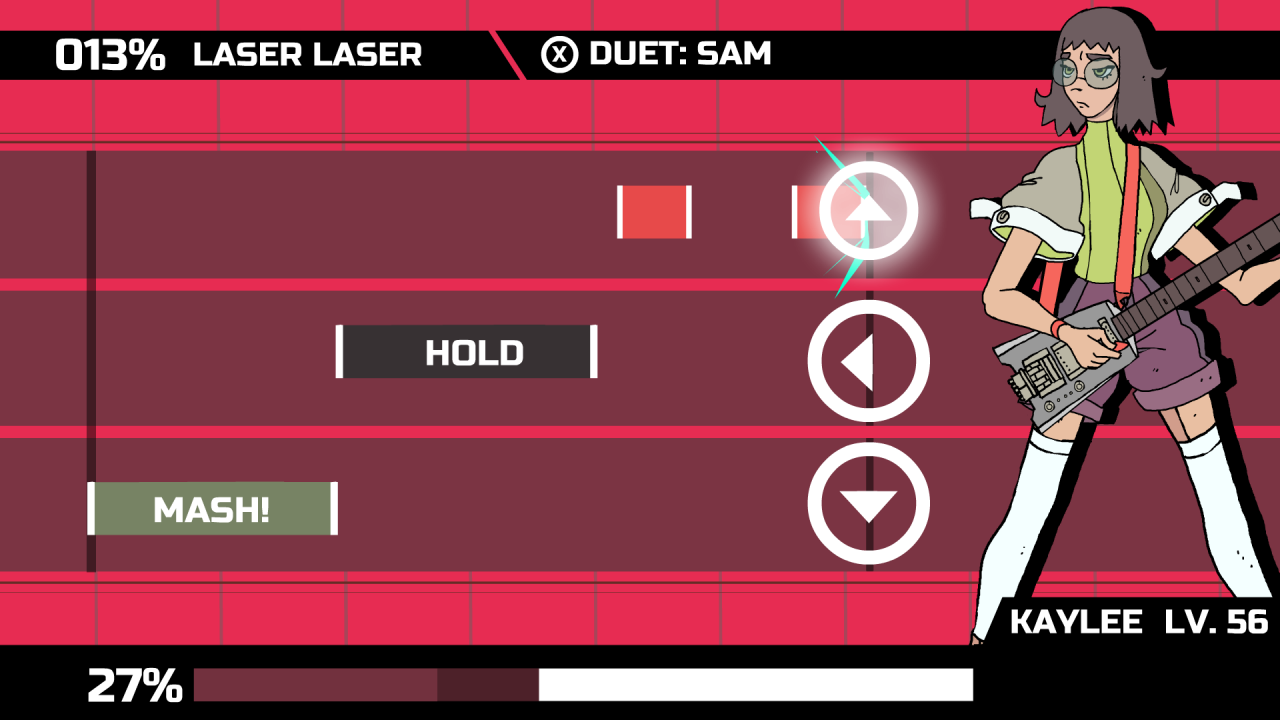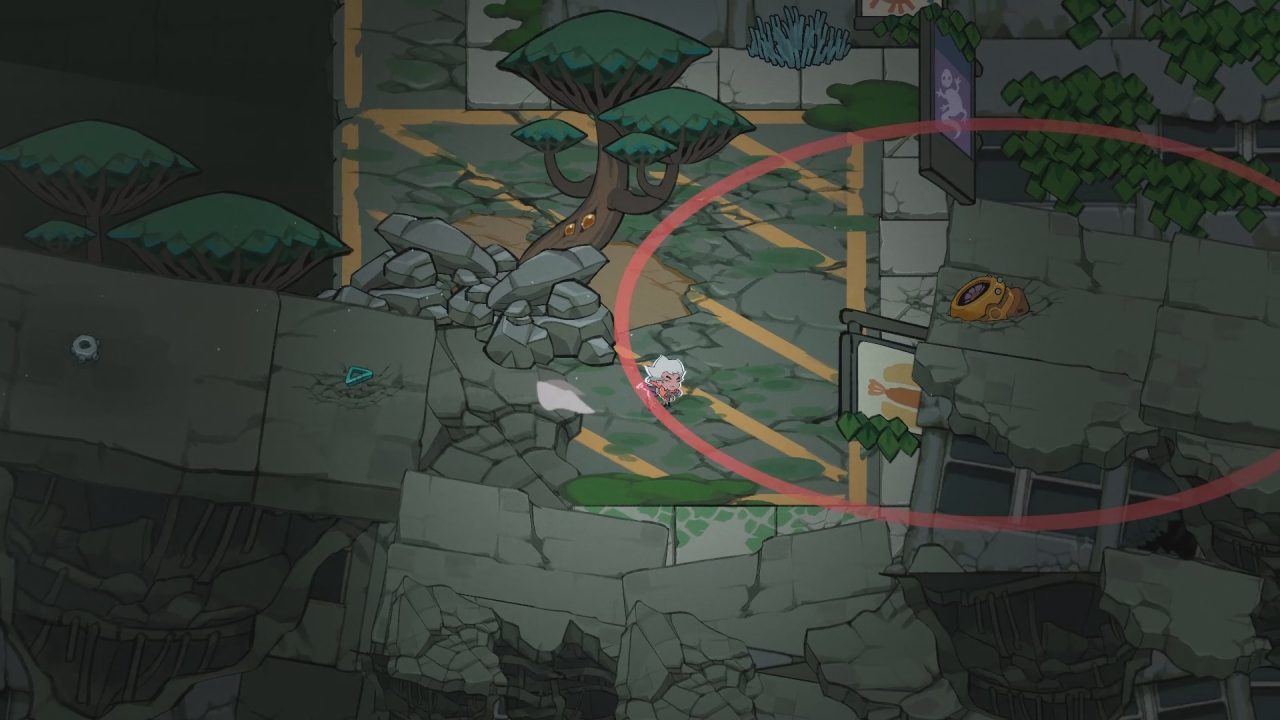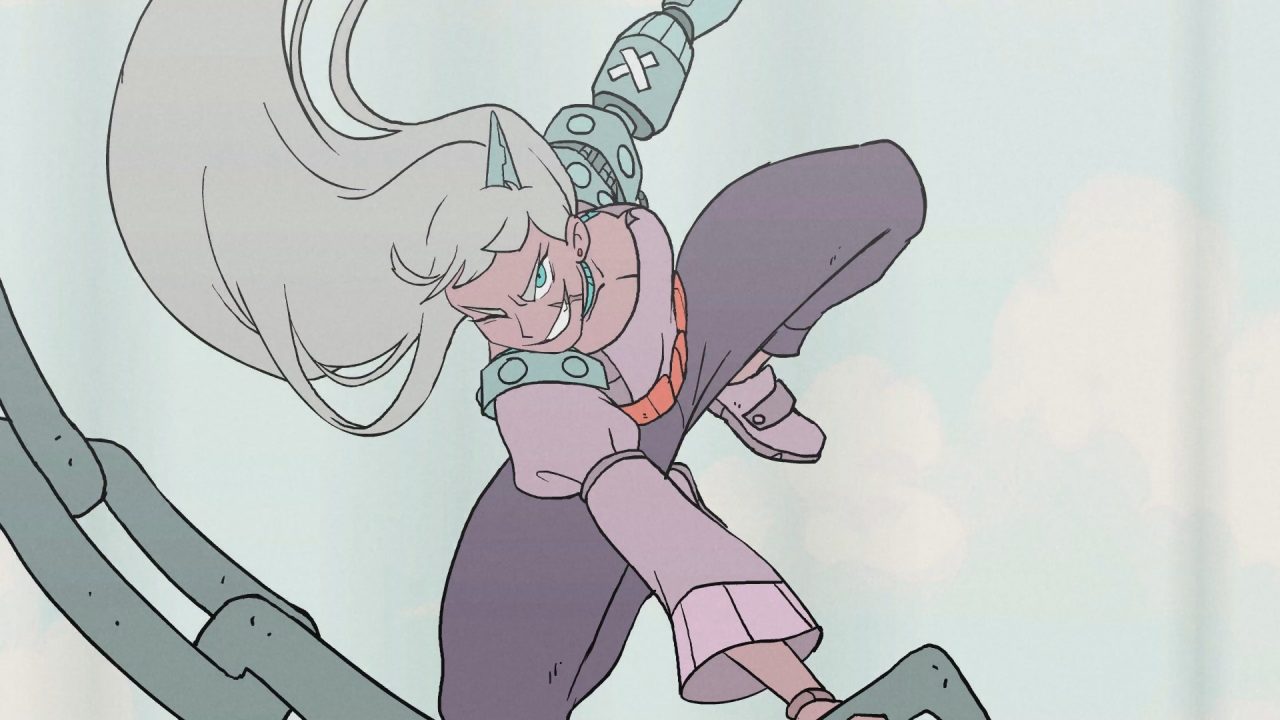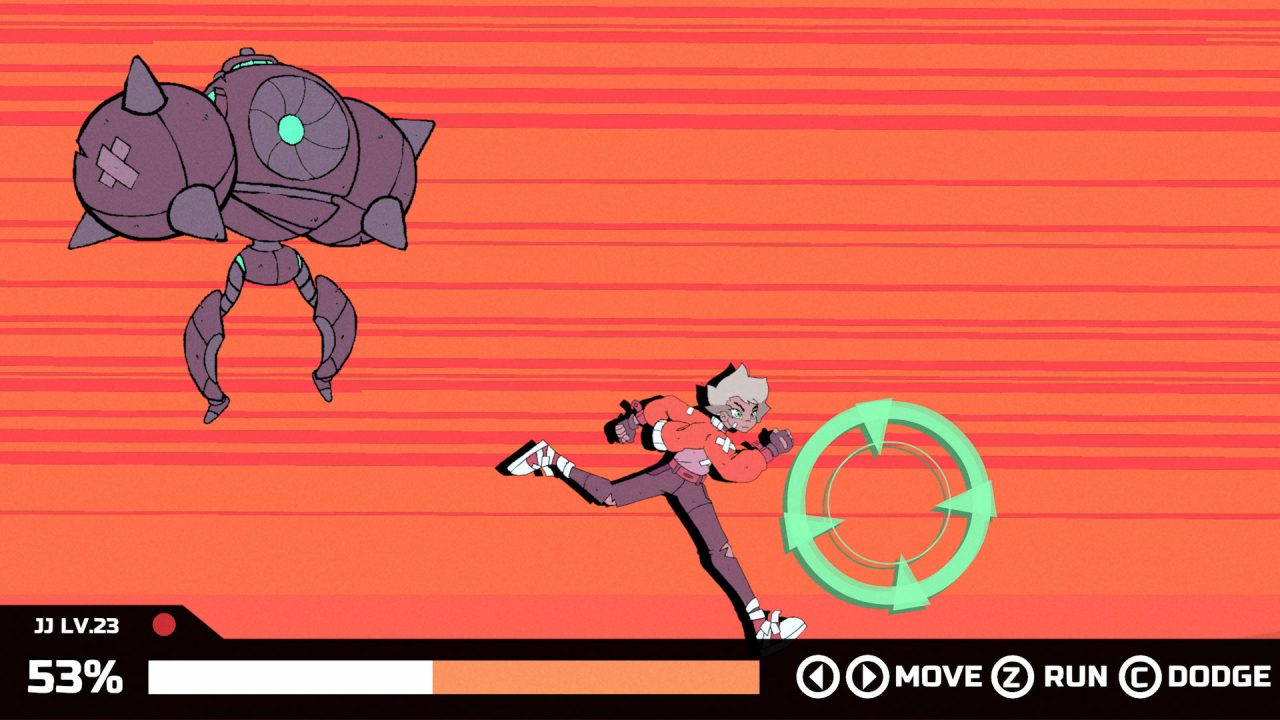Nikko Nikko‘s debut, Infinite Guitars, is a game about scrappy rock musicians wielding weaponized guitars in post-apocalyptic wastelands. This concept speaks to me because, from 2012 – 2015, I played bass in an alt-metal band where we sported a post-apocalyptic aesthetic in our stage attire. Now that I’ve experienced a full playthrough of Infinite Guitars, it is analogous to seeing many budding bands’ first gigs. Those bands’ creativity and passion for music were apparent, but their performance suffered because they didn’t spend enough time rehearsing and refining their songcraft. In the same way, Infinite Guitars has heart and potential, but it feels rushed out and could have used more development time.
I’ll answer the most crucial question: “Since Infinite Guitars is a game about musicians, how is the music?” Put simply, the soundtrack is phenomenal. Several composers contributed songs to Infinite Guitars‘ soundtrack, and each piece brings its unique style and flavor. The game’s world is a patchwork that one character compares to a mixtape, and the soundtrack achieves that mixtape feel in the best of ways. I love the juxtaposition of pump-your-fist elements of classic rock woven with contemporary “bob your head” sonic textures reminiscent of today’s remix artists. Music even weaves into the gameplay. Multiple battle themes require different rhythm game-style button inputs depending on where your turn lands in the song. During exploration in hostile areas, various obstacles to dodge trigger based on the beat of the background music. In short, this soundtrack is amazing both in and out of the game, and I could not get enough of this music.

Stopping to hear the music is detrimental because Infinite Guitars is a briskly paced game that stomps the gas pedal and never lets up during its 15-ish hour duration. The gameplay breaks down into Action, Turn-Based, and Rhythm elements, each with adjustable Easy-Normal-Hard difficulties. Action refers to the aforementioned action-based exploration where players run and roll to deftly dodge explosive obstacles to get from point A to point B. Turn-Based and Rhythm elements pertain to the battle system. Players and enemies take turns performing actions, and I like that during enemies’ turn phases, players can dodge their attacks with timed button presses. I didn’t have to stand there and take punishment from enemies! I could do something during enemy turns. I’d like to see more turn-based RPGs incorporate mechanics like that. Special attacks are pulled off during player turns using timed button press sequences akin to music-rhythm games like the various Hatsune Miku titles. With multiple battle themes and different sequences based on where you are in the music, the Rhythm aspect of battles keeps players on their toes.
Sadly, the mushy control response renders Action obstacles challenging to dodge, and the more nimble button sequences in Rhythm persnickety to pull off. I especially disliked enduring Action sequences at the start of boss battles. Those felt unnecessary and were irritatingly cheap until I FINALLY broke through into the turn-based battling. Several game updates have tightened up the controls, but plenty of room remains for refinement. Control response is tighter with the keyboard, but playing the game with it felt more awkward than using a gamepad. Control schemes are remappable, though the defaults are just fine.
The menu interface is stylish and usable, except for equipping character accessories. Players need to go into the Items tab to equip accessories onto characters, and doing so is rather twiddly. There is also no indication of which character is equipped with what accessory, making a simple task more ponderous than need be. I preferred Equipment to be its own menu tab instead of it being shoehorned into Items.
Infinite Guitars is a visually striking game that looks far more impressive in motion than on still screens. The head of Nikko Nikko is an animator by trade. It shows clearly in that even the stillest portions of Infinite Guitars have nifty animations that make the entire game feel alive with electricity. I love the expressive character art and appreciate that player and non-player characters sport a plethora of unique body types. Cutscenes and battle animations are explosive, and the special attack animations are skippable with a button press. Everything about Infinite Guitars‘ graphics oozes with style, and I said, “That is so cool!” several times. My only issues with the graphics are that field sprites are small, and there isn’t a huge variety of enemies. I would have liked some palette swapping to add unique flairs to similar enemies.

I’m bitterly disappointed that Infinite Guitars took such painstaking care to craft its music and graphics yet put so little care into crafting its story and characters. Put simply, the clunky plot is a hot mess. Some decent plot beats exist, but the disjointed storytelling negates any emotional gravitas they should have. The setup goes a little something like this: Protagonist JJ lost his dad in an apocalyptic war and is now under the care of his grumpy but well-meaning grandpa. During an outing with his grandpa, a series of haphazard circumstances put JJ on an arbitrary quest where he meets some friends along the way. JJ and company find themselves in several random (and very repetitive) situations with jarring stop-start transitions between plot points, too little exposition to flesh anything out, and moments when I had no clue where to go and what to do next. The series of bombastic “Wow! Explodey!” events JJ and his friends are continually thrown into have isolated cool moments but never tie together into a cohesive whole.
Stale writing renders the characters devoid of personality and challenging to get a bead on because they often act out of character. For example, the standoffish loner character who actively avoids being around people was the first to ask a complete stranger to join their team immediately. The heroes’ motivations for the quest were muddled, and I was not invested in their stories. The villains weren’t much better either and existed solely to thwart the heroes. Oh, and the reward for triumphing over the villains and saving the world is an unsatisfying ending.

Sloppy scripting exacerbates poor plotting. For example, JJ encounters a stranger who addresses him familiarly early, yet he never asks, “Who are you, and how do you know my name?!?!” Speaking of names, when new characters are introduced, their names appear on dialogue boxes instead of “???” before introductions. That’s silly because how would a protagonist know someone else’s name unless they tell him/her/them? As a result, Infinite Guitars lacks those careful little details that make RPG storytelling immersive.
Speaking of dialogue, several conversations were out of order. For example, during the second chapter, when JJ enters a town, he casually asks a girl where the Sub-Core (something neither he nor the player knows anything about) is. Several conversation points later, that same girl says they must head to the Sub-Core, and JJ replies, “Sub-Core, what’s that?” Another example of poor copy editing happens in the fourth chapter when a terse NPC (referred to here as NPC-1) demands JJ’s party fetch components to raise a bridge without explanation. Raising the bridge alarms another NPC (NPC-2), and JJ’s party mentions that they’re helping a victim (NPC-1) escape a tragic fate. At no point during the terse conversations with NPC-1 was there any mention of escaping a tragic fate! How would the party and the player omnisciently know the backstory of a laconic stranger in a strange land they encountered seconds ago? Infinite Guitars‘ slipshod storytelling feels like reading a book where every chapter has several missing pages.

I appreciate Infinite Guitars ambitiously shooting for the moon, even though it missed by a mile. The game’s aesthetics are spectacular, and I loved the dynamically adjustable difficulty levels, but the iffy controls and poorly put-together plot crippled my overall enjoyment. Another round of copy editing to peruse the script and tighten up the writing would have elevated the game into “you gotta check this out!” territory. Infinite Guitars has also been extremely buggy and glitchy since its release. Though multiple patches have been released and continue to come through (Nikko Nikko has been exceptionally responsive to player feedback regarding bugs), Infinite Guitars could have used more development and QC time before its stage debut. Should Nikko Nikko expand the Infinite Guitars concept into future games, I expect more polish, improved storytelling, and would like to see the evolution of Infinite Guitars into “Infinite Rock Band” featuring additional characters who play instruments other than guitar.


